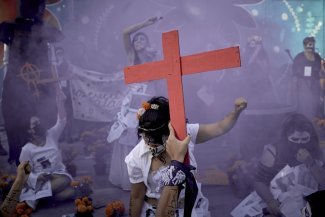Activists with the Centre for Equality and Liberty, a LGBTQI rights NGO, Lendi Mustafa and Liridon Veliu, in their office preparing for Pristina’s first ever gay pride parade. Pristina, 28 September 2017.
On February 17, Kosovo celebrated its tenth birthday. Europe’s youngest nation was forged into being following the 1999 war of independence against the security forces of the Serbian government, which for years had ruthlessly oppressed the ethnic Albanian population of its south-western province.
Yet, nearly two decades after the formal cessation of hostilities, victims of oppression remain in Kosovo. Among them is the country’s LGBTQI (lesbian, gay, bisexual, transgender, queer and intersex) community.
On paper, Kosovo’s human rights legislation and rule-of-law provisions are far above its neighbours. After all, the foundations for those laws were laid by seconded officials from the countries that had backed the breakaway nation in its war against Belgrade and subsequently administered the territory prior to its declaration of independence.
However, there is a mantra among those that follow developments in Pristina, Kosovo’s capital: “Legislation is one thing, implementation is another.”
Freedom from discrimination on the grounds of sexual orientation has been enshrined in the constitution since June 2008. And yet, the number of LGBTQI Kosovars that are willing to publicly identify themselves as such could be counted on two hands. Closeted or not, all those who spoke to Equal Times gave chilling testimony of what it means to be young and gay in Europe’s youngest country.
Ismail Cakolli is one of the few that have come out. The founder of Kosovo’s Gender Equality Movement, an NGO. Cakolli was previously a presenter for the country’s national broadcaster, RTK. Despite leaving showbiz behind, Cakolli remains a popular man.
Having met for an interview at a café on Pristina’s main pedestrian thoroughfare, the conversation was continually interrupted by friends coming up to greet him – among them a former Olympic champion boxer. But as he spoke, the picture he painted was of a far colder reception.
“Twice, boys from my neighbourhood have thrown rocks at me,” he said. “I didn’t report it to the police because I didn’t have evidence.”
With or without evidence though, his experiences with the police and those of other LGBTQI Kosovars suggest it is debateable how much good it would have done. One time he and a friend had wanted to visit a now-closed bar and the security staff made it clear their sexual orientation meant they were not welcome.
“We went to a police station and they laughed at us, they made jokes about us, asking us how we have sex, etcetera,” he says. No charges were brought. “Until today there is not even a single case that has gone to the courts, that’s the biggest problem”
Constantly hiding
In 2011, for the first time, Pristina had a gay bar. It lasted a matter of days. Nestled under Pristina’s football stadium, Pure Pure Bar quietly let it be known that LGBTQI customers were welcome. One enterprising staff member put out an advert on GayRomeo, a dating site. For his troubles, a local newspaper produced an article that resulted in threats and abuse being directed at staff and patrons, according to multiple members of the LGBTQI community.
Equal Times attempted to make contact with the former owner of Pure Pure, but was told by multiple intermediaries that he was unwilling to speak with the press, keen not to see a repeat of his experience in 2011.
Blerim – not his real name – will soon finish high school. We met in Dit e Nat, a café-cum-bookshop in the city centre. It serves a vegetarian menu and macchiatos, soundtracked by indie bands and jazz records to a clientele of young, trendily dressed students, artists and junior civil servants. While not a gay bar, Dit e Nat is gay friendly, although it does not broadcast the fact. Blerim said it is one of three places in Kosovo he feels completely at ease.
Of the remaining two, one is another quietly gay-friendly café and the third is an apartment in the city centre. It is home to the Centre for Equality and Liberty (CEL), an NGO established five years ago for the protection of LGBTQI rights. For security reasons, its location is not listed on its website. Instead its address is passed on by word of mouth as a place of sanctuary and support.
On any given weekday afternoon, its small drop-in centre will be crammed with dozens of people, ranging from popular performers on break from rehearsals to teenagers finished with school for the day. At CEL, they laugh, joke and relax, free for a few hours to be fully themselves.
A report published last December by the Youth Initiative for Human Rights goes some way to explaining why Kosovo’s LGBTI youth may not feel so comfortable at school.
It examined the use of discriminatory language in textbooks and found that a civics textbook equated homosexuality with “disorders” and “criminal behaviour”. Meanwhile, a biology textbook said that homosexuality “deviates from normal behaviour and is noted as a deviant behavioural form.”
When Equal Times dropped by the CEL apartment the mood was especially buoyant. CEL was preparing for Kosovo’s first ever gay pride event. Blerim was among those plotting.
“It’s kind of scary, but at the same time I would love to be part of it,” he said. “I call this a half pride, because pride is when you celebrate and we’re not free to celebrate yet.”
He had good reason to be cautious. On Valentine’s Day 2014, a four-woman artistic collective called Haveit staged a piece of performance art in the heart of Pristina that had far greater repercussions than any of them anticipated. Speaking late last year outside a Pristina art gallery that in a past life housed the city’s boxing club, Haveit member Lola Syla recalled the origin of the piece.
“We were talking in a café about Valentine’s Day and how all the celebrations are all about straight people, while the LGBTQI community cannot even holds hands,” she said. “We were talking about this and then it came really fast, two days before we said, ‘Ok, we will go out and have a picture kissing each other.”
The photo went viral. Just three hours after it was posted online it had been shared 90 times, according to Balkan Insight. But while some sent messages of support, others left photos of nooses and hangings and accusations that they had brought shame on Albanian culture and traditions.
“We were really scared. We got a hundred death threats to our Facebook page,” Syla says. “We went to the police, they already knew that we did the kiss, somebody had filed a report that girls were kissing in the street. They listened to our story, but the main question they wanted to ask was if we were lesbians.”
The police’s recommendation? Delete the photo.
Signs of progress
Four years on, while the situation for Kosovo’s LGBTQI community is still very far from ideal, there are signs of progress. The pride parade went off without a hitch on 10 October, and negative responses to LGBTQI themes in the performing arts are far more muted than they once were, if the reception of a new play is anything to go by.
Perhaps more than any other playwright working in the country today, Jeton Neziraj is constantly pushing the boundaries of what is acceptable subject matter in Kosovo. When his latest outing, 55 Shades of Gay, had its premiere last autumn police were stationed at the door. As it turned out they were not needed.
There were no death threats, no disruptions to the performance and no vandalism of the enormous promotional poster that, as Neziraj pointed out, hung from the National Theatre for two weeks undisturbed.
However, the playwright does not believe that Kosovo’s homophobes have disappeared or changed their minds in the last few years.
“They know that any kind of public showing of any kind of homophobia or hate speech will be paid, so to speak, that they will be held responsible,” he said. “[But,] for me, having this show in the National Theatre in Pristina is a big sign of people’s emancipation on this issue. It doesn’t mean that people have changed their mind, but for me it is enough to have this show without protests.”
Meanwhile, Kosovo’s LGBTQI community are waiting for that emancipatory process to complete. In a 2015 poll conducted by the National Democratic Institute, 81 per cent of LGBTQI Kosovars interviewed said they had been subjected to psychological abuse due to their sexual orientation, while 29 per cent reported being victims of physical violence as a result of their sexuality. Half of those that reported physical attacks said the main perpetrators were their friends.
The example set from above is no better. Kosovo’s top politicians make the right pro-LGBTQI noises and attend the right events, but this is largely to please ambassadors from Kosovo’s benefactors.
Take, for example, the speaker of parliament, Kadri Veseli. In 2015, the website for Kosovo’s parliament reported Veseli as saying the country’s constitution and culture of tolerance enabled it to be “as effective as possible in combating the prejudices and stereotypes faced by members of the LGBTQI community.” However, the following year leaked wiretaps revealed Veseli’s personal feelings were perhaps not in line with his public statements after he was heard referring to an opposition politician as a ‘peder’ – faggot in Albanian.
So how long does Kosovo’s LGBTI community have to wait for emancipation? According to Blerim, the high school student: “Maybe five or ten years, then it’s going to be such a nice pride.”










